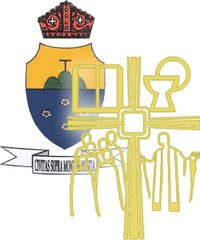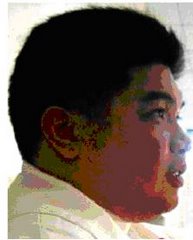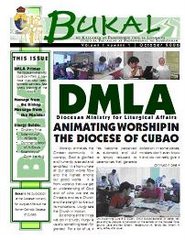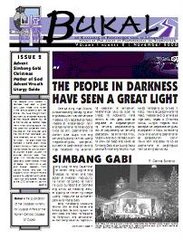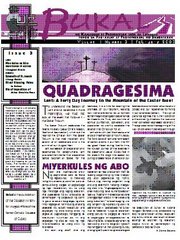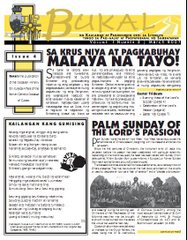LITURGICAL MUSIC FOR THE SEASON OF ADVENT
Prepared by: Rundolph Fernandez Bayaua
Ministry for Liturgical Affairs
Diocese of Cubao
After the long season of Ordinary Time, the music of the Advent season greets us like a breath of fresh air. But there is so much music and so little time in which we sing it! This is especially true during particular year when the season is only three weeks long.
Catholic parishes are universally laudable in their rising above pressures to anticipate the musical repertory of Christmas. That’s the easy part. But keeping the spirit of Advent celebration distinct in other ways will surely follow if we immerse ourselves in the intricately evocative texts of the season and faithfully use all our imagination. The Church and her liturgy can become a welcome refuge from the more tawdry manifestations of commercial “holiday season” around us. Music is utterly a key in this. The occasional ill-instructed worshipper, who complains that he or she wants “carols that will get me into the Christmas spirit” throughout the December madness, surely knows that the local shopping mall will minister to that “need” better than we can. The music of the Catholic Church is busily going about other, and very important, concerns. And the “Christmas spirit” we know is not what the world knows nor, oftentimes, is our music.
Refrain from using Christmas music (this includes music for the Fourth Sunday of Advent) until the Christmas Liturgies themselves occur. Christmas tunes, both religious and secular, may have been surrounding us and even before Advent, but for the liturgy the Christmas season does not begin until Christmas Eve.
Marking off Advent from other days and seasons: If you usually have busily festive instrumental music before Mass, try having only the most meditative. If you usually have elaborately meditative music, try having sparse music there, or none at all.
A choir might sing some simple invitatory chant. Or, if you begin Mass with a metrical hymn, you might preface it with the proper entrance antiphon from the Graduale romanum (if your music ministers are practically skilled) or from the Graduale simplex (even if they’re not). Catechesis on those texts and their communion counterparts is itself a course in Advent celebration.
The repertoire of music and psalmody for the advent season is enormous. While we have our old favorites, examine the diversity of the available music that will function during Advent as we move from the eschatological focus to the incarnational focus. Live, instrumental and liturgical music can help create a mood. Acapella singing of an entire hymn or verse of a hymn can create an atmosphere of longing and expectation.
Hymns about Saint John the Baptist are especially fitting on the second and third Sundays of Advent. Those are the days when the gospel tells some aspect of John’s life and ministry. This is true every year during Advent.
Hymns of the Virgin Mary will be especially appropriate on the Solemnity of the Immaculate Conception, as well as on the Fourth Sunday of Advent, when the gospel tells part of the story leading up to the birth of Jesus.
Gospel Acclamation: You might choose an Alleluia that will last throughout the season. As always, the verse would change, but the lectionary groups them into those of the first (#192) and second (#201) parts of the season. The first set features scriptures that announce the coming of the Savior together with non-scriptural proclamations of the same hope. The second group represents the O Antiphons from Evening Prayer. These seven verses are completely interchangable, but careful planning will unite them to the Magnificat antiphon sung that evening or the previous one.
The suppression of the singing of the Gloria during this time, does not indicate penance or of penitential character, but allows the angelic hymn to be sung anew on Christmas Eve. The Gloria in excelsis Deo is omitted on the Sundays of Advent. This streamlines the entrance rites and derives the liturgy more directly towards the scriptures. When the hymn returns at Christmas, it will lift hearts high in joy. A temporary abstention should help us not to fall into routine and to make a better and more conscious use of this beautiful hymn afterwards.
The Gloria is omitted during Advent. By reserving the Gloria for the festive season of Christmas, the liturgy emphasizes Advent’s character as a season of anticipation. The Gloria is not omitted in Advent for the same reason it is omitted in Lent. Rather, its omission heightens our anticipation and longing for the night of Christmas on which the angels’ song rings out anew. In practical terms, the omission of the Gloria also allows us to move quickly to the collect and the Liturgy of the Word.
The words “Gloria in excelsis Deo” are so characteristic of Christmas that their rubrical omission from Sunday Masses in Advent is just common sense, but “Glory to God in the highest” has its Advent role nevertheless. Plus the fact that the festive commemoration of the Immaculate Conception falls in Advent gives us a chance to prepare for Christmas in a different way from that of the Advent Sundays. Not only does December 8 have its Gloria, but singing the same Gloria then that you’ll sing on Christmas makes a lot of sense. One way, after all, of preparing for the December 25 solemnity is by making sure everyone is ready to sing out with joy on a song central to Christmas’ essential character. Second, it allows Mary’s feast to serve Christ’s in something of the way Mary’s ministry assists His, even in a musical detail. Third, the liturgy already gives us a hint of this function by its Responsorial Psalm, which is the same psalm on Immaculate Conception as at the Mass during the Day on Christmas (and the other two Christmas Masses sing from the immediately preceding and thematically connected numbers of the psalter). Consider finding a way (be it bells other percussion, distinctive tune, or placement of singers in a special antiphonal arrangement around the church) to highlight the connection of these psalms. Music can make all kinds of liturgical and theological connections on conscious and unconscious levels.
For Eucharistic Prayer Acclamations try using one set throughout Advent and on into Christmas. People will be able to sing these as true acclamations if they stop wondering which one it will be this week. This practice also gives the season an identifiable sound. You might even use the same set each year to help people make more associations between the music and the season. Any of the memorial acclamations may be sung, but the first three announce the theme of Christ’s coming better than the last does.
Even in Advent, you may still want the Eucharistic acclamations to keep the exuberant mood of high celebration that can always attend those signal moments. It’s also possible to let them partake of some of the restraint of the season (here being another place where local expectations and experience will dictate the best practices).
If you do a “Recessional Song,” “Closing Hymn,” “Sending Forth,” or “Hymn at the Dismissal” (the variations of terminology demonstrating the optional nature of that song not envisioned in the Ordo Missae), you might consider uniting the Sundays with a single song, repeated each week. The Taize “Wait for the Lord” fills the bill nicely. Parishioners say that its tune-with-words haunts their meditations year round.
The tradition of using music that is more “subdued” during the season has been given predominance by the direction in article 313 of the new GIRM: “In advent the organ and other musical instruments should be used in moderation that is consistent with the season’s character and dos not anticipate the full joy of the Nativity of the Lord.” This stops short of the direction regarding Lent, which limits instruments to the accompaniment of singing. Yet it certainly calls for the music to be more simple and unadorned than in the other seasons. Even aside from the texts that are sung, a worshipper should sense that the music sounds like Advent.
During Advent musical instruments should be played with a moderation that is in keeping with the spirit of joyful expectation characteristic of this season but does not anticipate the fullness of joy belonging to the celebration of the nativity of the Lord. (# 41 Ceremonial of Bishops, Congregation for Divine Worship, 14 September 1984)
